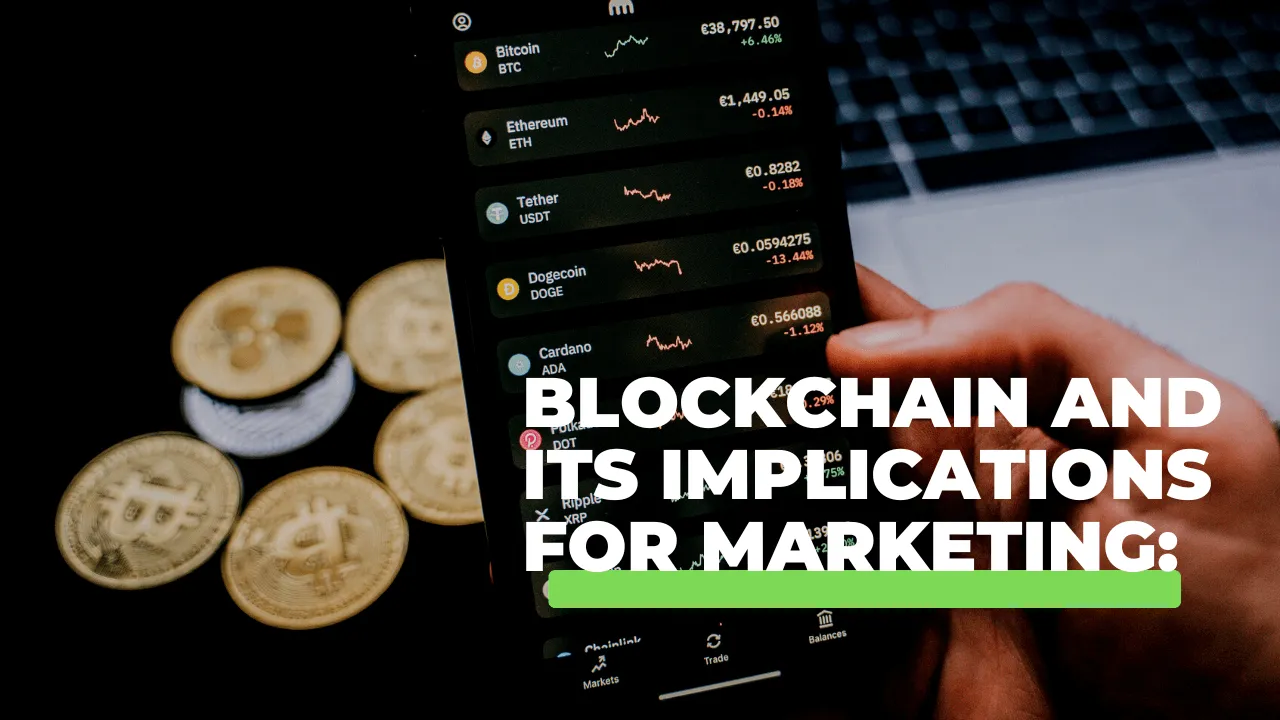
Cryptocurrency and Blockchain in Advertising: Challenges and Prospects
Advertising
Introduction
Bitcoin and the technology on which it will be developed, the blockchain, engaging people towards it by making people interested and investigation through which people gain knowledge by using and analyzing their advertising next generation application in the advertising sectorIn this era where word is going to be digital soon with the big confusion, It’s more exciting to see the changes in advertising market from old marketing strategies to new crypto strategies and we all know that these conventional changes will help us to target more audience. If we talk about two types of crypto-currencies that are bitcoin as first all know and second one is echium, they have also gained importance not just in advertising firms but also in the form of alternative tool use in form for the transaction purpose. Conversely, the blockchain is mainly recognized by its decentralized system and transparency. It plays a vital role in all industries especially in two, that are advertising and in the wallet industry. For the transaction purpose the tools built with blockchain technology with the concept of blockchain are more powerful now-a-days that’s why they are used for the transaction purposes.
When we do research about the “Cryptocurrency and Blockchain in Advertising firm: Blockchain Challenges and Prospects,” then we will set out the intangible connection between these blockchain technologies mostly called wallet technology or crypto with the advertising industry. We have faced many challenges when we integrate the power of crypto-currency with its transactional factor in advertising, navigating the legal and regulatory landscapes, and coping with these digital assets of crypto-currency in a volatile manner. The blockchain technology can’t be stopped their, it also investigate about the false ad and remove it from web with its strong algorithm/
Investigating how blockchain might improve advertising's openness and security of data
I. Blockchain and Its Implications for Marketing:
Increased transparency and strengthened data safety are only two of how blockchain reshapes the dynamic advertising market. The blockchain’s transparency and ability to reduce false advertising are two primary reasons for this shift.

Enhanced Transparency through Blockchain:
Blockchain-distributed payment systems are like ledgers with the potential to do transactions, and their architecture lies in the depth of their technology measures, if I may say in the heart of their transparency-enhancing capabilities. Traditionally, advertising transactions involve multiple intermediaries, leading to opacity in the flow of funds and data. However, with blockchain, every transaction is recorded in a secure and immutable manner across a network of nodes. It creates a record that is validated and has a tamper-proof guarantee in the case record, and also, this record is also accessible to visitors and advertisers. That is why advertisers & publishers trust it because of its transparent nature and cost-effectiveness. A transparent nature is what the advertisers can see from content creation to delivery in the ad campaign process.
Impact on Ad Fraud Prevention:
Blockchain’s decentralized nature disrupts the modus operandi of ad fraudsters. Ad fraud, a persistent challenge in the advertising ecosystem, encompasses various nefarious activities like click fraud, impression laundering, and bot traffic. Blockchain’s transparency renders such activities more difficult by eliminating single points of control. Ad impressions and clicks are recorded on the blockchain, and any attempt at manipulation becomes instantly noticeable due to the distributed consensus mechanism. Ad deception has decreased due to this strict testing procedure so that businesses may spend money with confidence.
II. Challenges in Cryptocurrency Advertising:
Knowing the potential legal and regulatory hurdles you may face while promoting cryptocurrencies might assist. This section will review some legal and regulatory hurdles that might crop up while promoting cryptocurrencies.
Legal Uncertainties and Varying Regulations:
The foremost challenge in cryptocurrency advertising is consistent legal frameworks across different jurisdictions. Cryptocurrencies often exist in a regulatory gray area, subject to diverse interpretations by governments and regulatory bodies worldwide. This regulation variance poses a significant challenge for advertisers aiming to promote their cryptocurrency-related products or services globally. Determining how specific activities, such as Initial Coin Offerings (ICOs) or token sales, comply with local laws can be intricate and time-consuming.
Regulatory Compliance and Consumer Protection:
Given cryptocurrencies’ decentralized and borderless nature, advertising campaigns must tread carefully to ensure compliance with relevant regulations. The law may impose restrictions and penalties if compliance is not met. It is essential to safeguard individuals from the risks associated with bitcoin trading, and use is also pressing. Advertisers must walk a fine line between highlighting the advantages of cryptocurrency and warning users about their vulnerability to frauds and price fluctuations.
Misleading Claims and Ethical Dilemmas:
Cryptocurrency advertising has witnessed misleading claims and unethical practices, primarily due to the market’s relatively nascent and speculative nature. Unscrupulous advertisers might exaggerate potential returns or downplay risks to lure unsuspecting investors. It damages the cryptocurrency industry’s reputation and risks consumers financial losses. Ethical dilemmas arise concerning responsible advertising that educates rather than misleads potential investors.
Social Media and Platform Restrictions:
Major social media platforms and advertising networks have imposed restrictions on cryptocurrency-related ads. It can hamper the reach of legitimate cryptocurrency projects and make it challenging for advertisers to convey their messages effectively. Specific prohibitions have been enacted to safeguard consumers because of the frequency of fraud and fraudulent activities in the Bitcoin market.
III. Cryptocurrency Advertising Prospects
The convergence of innovation and disruption in cryptocurrency is set to reshape advertising strategies and customer interactions. With the increasing popularity of cryptocurrencies comes the possibility of profound and varied changes to the advertising industry. One notable prospect lies in the realm of cross-border advertising. Cryptocurrencies transcend traditional currency barriers, enabling seamless transactions across geographical boundaries. Having to cope with the difficulty of currency conversion or changes in exchange rates is a unique chance for businesses to communicate with clients all around the globe. Furthermore, cryptocurrencies allow users to cut out middlemen, streamlining the advertising value chain by lowering transaction costs and speeding up payments.
The integration of cryptocurrencies, however, should be more comprehensive than just financial ones. Tokenized loyalty programs provide a fresh approach to interacting with regular clients. Marketers may strengthen their relationships with their target audience by using tokens issued on the blockchain as rewards and incentives. However, these futures are challenging. Uncertainty in regulations and the need to educate consumers still need to be addressed. Businesses must keep up with the ever-changing Bitcoin legislation and guarantee that their cryptocurrency-based marketing strategies comply. At the same time, spreading knowledge about cryptocurrencies’ upsides, downsides, and workings is crucial to increasing public acceptance.
The Promotional Blockchain of the Future:
This part will be about looking forward and imagining how blockchain-powered advertising solutions could destroy continuing promotional structures. We explore the background of the blockchain system and the various possibilities for the future of marketing.
Predicting the Potential Trajectory of Blockchain-Powered Advertising Solutions:
The immutable and decentralized nature of blockchain is preparing for a transformation in advertising. One path may be for the advertising ecosystem to become more open and responsible for its actions. Increased use of digital currencies might provide unbeatable insight into the whole advertising process, from planning and execution to audience response. This openness would encourage honesty and responsibility, reducing ad fraud and data manipulation worries. Furthermore, smart contracts may automate payment procedures, guaranteeing publishers and contributors equal reimbursement according to preset parameters.
Speculating on the Disruption of Traditional Advertising Models by Blockchain Technology:
Blockchain’s potential disruption of traditional advertising models is the subject of intense speculation. Due to the way it works, bitcoin eliminates unnecessary intermediaries, which would boost efficiency and reduce costs. Advertisers and publishers could engage directly, erasing layers of intermediaries.This peer-to-peer network could redefine the dynamics of the advertising industry, give more power to individual creators, enable micro-transactions for consumption and what’s more, if ads are viewed using blockchain tokens , it can reward users for their attention. The value is changing between advertiser and content creator.
Conclusion:
Several vital takeaways emerge from the rapidly evolving realm of cryptocurrency and blockchain in advertising. First, the inherent transparency of blockchain technology addresses the longstanding challenge of accountability within the advertising industry. Through decentralized ledgers, advertisers, publishers, and consumers gain unprecedented visibility into ad campaigns, fostering trust and combating fraud. Second, the challenges in cryptocurrency advertising, including regulatory uncertainties and ethical concerns, underscore the need for careful navigation and responsible practices. Advertisers must adapt to shifting regulations while ensuring consumer protection and adherence to ethical standards.
Looking forward, the potentially transformative effects of blockchain on future advertising landscapes are profound. Blockchain’s potential to disrupt traditional models, enhance transparency, and reshape value exchanges holds immense promise. By promoting greater accountability, enabling direct interactions, and redefining consumer engagement, blockchain is a beacon of innovation in the dynamic advertising world.
FAQs:
1. How does blockchain technology enhance transparency in advertising?
Blockchain’s decentralized ledger records every transaction in a tamper-proof manner. Businesses, publishers, and users benefit from increased trust and lower deception rates because of this openness.
2. What challenges does cryptocurrency advertising face in terms of regulations?
Cryptocurrency advertising encounters varying regulatory frameworks across jurisdictions. Determining compliance with local laws and navigating evolving regulations can be complex, requiring careful consideration and legal expertise.
3. How can businesses leverage blockchain for cross-border advertising?
Cryptocurrencies facilitate seamless cross-border transactions without currency conversion complexities. Businesses can tap into global markets without the constraints of traditional payment methods, fostering international growth.
4. What role do cryptocurrencies play in loyalty programs for customer engagement?
Cryptocurrencies enable the creation of tokenized loyalty programs, incentivizing desired customer behaviors. Based on blockchain, these rewards enhance engagement and offer transferable value, fostering deeper consumer connections.
5. How might blockchain disrupt traditional advertising models?
Blockchain’s decentralized nature could eliminate intermediaries, enabling direct advertiser-publisher interactions. This peer-to-peer engagement might reshape power dynamics, introduce microtransactions, and empower individual content creators.
6. What considerations should advertisers keep in mind when integrating blockchain solutions?
Scalability, user education, and regulatory compliance are crucial factors. Advertisers must evaluate the feasibility of integrating blockchain while addressing these challenges to ensure seamless implementation.
7. How can blockchain's transformative effects be harnessed for future advertising landscapes?
Blockchain might revolutionize how wealth is transferred, open up opaque systems, and simplify administrative tasks. Advertisers can capitalize on its promise by fostering greater accountability, exploring innovative engagement models, and adapting to industry trends.
8. What are the benefits of using cryptocurrency for advertising transactions?
Cryptocurrencies offer reduced transaction costs, expedited settlements, and global accessibility. These advantages streamline cross-border payments and enhance operational efficiency in the advertising ecosystem.
9. How can advertisers balance the benefits of cryptocurrency promotion with responsible practices?
Advertisers should prioritize ethical advertising by transparently educating consumers about cryptocurrencies’ risks and potential rewards. Balancing promotional efforts with responsible practices is essential for fostering trust and credibility.
10. What resources are available to learn more about how blockchain technology, cryptocurrencies, and marketing all fit together?
Explore this site for in-depth information and analysis.
- CoinDesk: CoinDesk offers a dedicated section covering blockchain and advertising, providing insights into how cryptocurrencies and blockchain technology influence advertising strategies and industry dynamics. Website: https://www.coindesk.com
- Cointelegraph: Articles and analyses on the interplay between blockchain technology, cryptocurrencies, and the marketing world are featured on Cointelegraph. You can find discussions on challenges, opportunities, and emerging trends. Website: https://cointelegraph.com.
Reference sites:
- Cryptocurrency News and Insights
- Latest Updates on Blockchain Technology
- Forbes – Cryptocurrency Section
- Cointelegraph, or “Cryptocurrency News and Analysis
- AdAge – Advertising Industry News and Insights
- Brave – Privacy-focused Web Browser and Ad Platform

